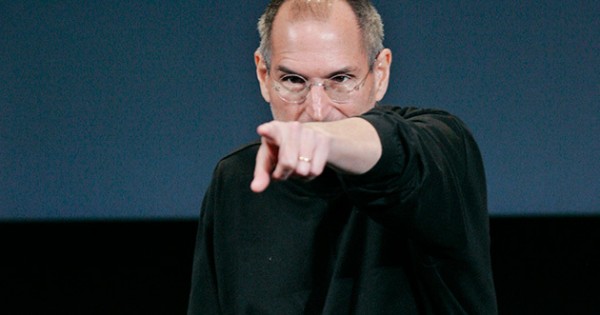I wish I could show you the pros and cons of Steve Jobs from an objective standpoint; from a view with no emotion, loyalty, or attachment. And I probably could if I tried REAL hard…
…ahhh who am I kidding?? Jobs is the man!!
I mean we all know the story: kicked out from the company he founded, brought back when it was on the brink of bankruptcy, and made it into one of the most profitable and coolest companies in the world.
How cool is he? He is the most admired entrepreneur among teens, easily beating out Mark Zuckerberg and Jay Z.
That’s cool.
And yet what makes Jobs so unique in my opinion is not the technology or products…but his ability to turn Apple into a startup culture. Because in the end it’s a culture that drives results and good leadership drives a good culture.
So there’s a obviously more than a few things startups could learn from him, namely:
1. Have a Purpose Beyond Making Money
Great entrepreneurs have a purpose that goes beyond making money. It’s the new definition of success.
Don’t get me wrong–they make money but also set out to change the world in some way. The purpose embedded in Apple’s DNA has always been “to democratize technology.” And the world has literally been changed by that purpose.
When Apple was under the leadership of John Sculley (after Jobs was kicked out) it focused more on marketing than engineering; on pointing out past successes than looking for future opportunities. That set the tone for a very expensive downward spiral.
According to Jobs:
“Apple was in very serious trouble. Apple had to remember who Apple was because they’d forgotten who Apple was.”
It needed its purpose driven founder to take it from bad–to good–to great.
2.”Good” is NOT Good Enough
A couple of months ago Nike president and CEO Mark Parker asked Steve Jobs for advice. His response:
“Well, just one thing, Nike makes some of the best products in the world. Products that you lust after. Absolutely beautiful, stunning products. But you also make a lot of crap. Just get rid of the crappy stuff and focus on the good stuff.”
Simple.
Jobs views products in one of two ways: “Insanely great” or “s#!t” With him, there’s no middle ground.
This is so essential because, according to Seth Godin, remarkable is a necessity today. No one pays top dollar for good, no one invests in it, no one builds great marketing campaigns around it, no one raises funding for it, no one writes about it, and etc. Good is pushed to the side so people can see the extraordinary, the different, the spectacular, and etc.
Jobs focused on great and changed the world in the process.
3. Know When to Pick Fights
Apple has always took pop-shots at Microsoft in their ads:
Very FUNNY pop shots!
Great startups use the strategy of picking fights time and time again:
- Jezebel picked a fight when they called the Daily Show sexist
- Posterous picked a fight with Tumblr…telling Tumblr users they need to graduate to Posterous (ooooooooooh!!!!)
- 50 Cent took swings when he was just starting out: he wrote a song about robbing other rappers
Now to be honest, picking fights doesn’t always work. With the previous four examples:
- Jezebel’s post got over 211,00 page views, 1,000 comments, and a sharp retort from the ladies of the Daily Show
- For all its talk Posterous still got spanked in terms of usage and growth
- The rappers got mad, fired back (the most famous being Jay-Z), and according to 50 it was the “best thing” that happened
The best times to pick fights are: when you can BACK up what you’re saying and you can handle the returning swings.
Apple was obviously prepared for both.
4. Use the Freemium Model Wisely
Free, as a business tool, is neither new or innovative. And granted there are success stories of businesses that use the freemium business model, namely: Skype, Box.net, Evernote, YouSendIt.com, and etc. There have also been companies that weren’t able to capitalize, such as Ning.com, which had “happy customers” but no more money, and etc.
Jobs used the Freemium model when he built the Apple store; and he did it with a very nervous board– they saw it a risky cash drain. But he wanted to reach the masses and not just the regular Apple user. The strategy obviously paid off as people were able to sample Apple’s products for free.
The main reason some succeed with Freemium are:
- The keep their acquisition costs low
- They understand their needed conversion rate
- They have a “frequent use” product
Apart for the first one, Jobs have use this model wisely…and its paid off in billions!
5. Make Money
As a young startup Steve was kicked out from Apple and had to sell NeXT because he didn’t pay attention to the bottom line.
He obviously learned his lesson since then.
At the end of the day: cash flow is king! And that’s all I’m gonna say on the matter 🙂
Is there anything I missed? What do you think?
Michael G. Holmes is an author, speaker, blogger, and internet entrepreneur. When he’s not eating Chipotle’s chicken burritos or screaming at fighting matches he can be found teach Biblical Strategies for Startups on his blog. This post is an excerpt from his ebook What Steve Jobs Could Teach Gen Y Startups.





